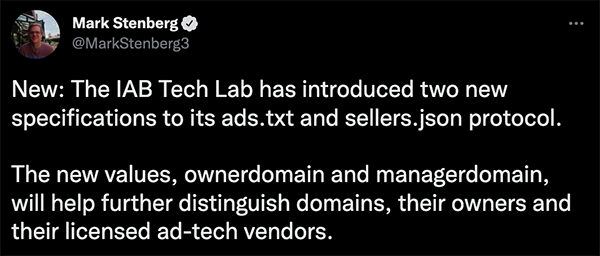 |
||||||||||||
|
||||||||||||
| JCPA Might Bring Power Back to Publishers and Support the Battle for Privacy |
 |
| A group of bipartisan House and Senate lawmakers has taken a page from the Australian government in an attempt to pass an updated version of the journalism competition bill. The Journalism Competition and Preservation Act (JCPA) could help news outlets receive their cut of content revenue from the notorious “Duopoly”–Google and Facebook. If the bill is passed, it could even the playing field for publishers, especially local ones. When the bill was brought to the Senate floor at the beginning of 2021, the Duopoly’s response could be likened to a tantrum. They rang off a string of threats such as restricting their News features in retaliation. Will they be more cooperative this go-round? Members of both parties have bolstered support for the bill, but many express concern about it passing during the midterm elections. The updated version of the JCPA includes several new terms:
|
| The ad tech industry has been wary of the two tech titans for years. Even more so, now that Amazon has created a trifecta and given birth to a three-headed monster. This, and a plethora of other reasons, has been the catalyst for the new privacy laws and the near departure of the third-party cookie. The industry is craving for some power to come back to the entities that provide the data and content. This bill could be a step in doing that. According to sources, the bill could, “infuse billions of dollars from Google and Facebook to pay journalists over its eight-year duration.” Australia’s News Media Bargaining Code has already brought news organizations $140 million in revenue. The JCPA also might be a step towards dismantling the systems put in place that have allowed big tech to hoard consumer data and the revenue that comes with that. Democratic Senator, Richard Blumenthal, said, "Big Tech companies have used their unchecked access to private personal information to create in-depth profiles about nearly all Americans and to protect their market position against competition from startups." The bill will most likely head to a vote at the beginning of September. Whether the decision will favor big tech companies or publishers has yet to be determined. |
| Looming “Recession” Reduces Ad Spend, But Podcasts Set a Different Trend |
 |
| Ad spend projections for the upcoming year have been all doom and gloom. Whether you believe we are in a recession or not, the data suggests that general ad spend will decrease next year. According to a recent Warc study, ad spend this year has had a positive uptick for an assortment of reasons. There was an 8.3% increase in global ad spend reinforced by investment in political ads and a revenue boost for the World Cup. The study asserts this is where the good news ends. The projections for 2023 show a much slower growth rate of only 2.6%. In fact, social media platforms are projected to lose about $40 billion of revenue opportunity between this year and next. Advertising experts have advised brands to keep investing in ad spend despite these projections, but some have not taken heed. Microsoft, for instance, reportedly cut entire channels from their marketing plans. And companies like Meta, the New York Times, and others have reported being impacted by the ad spend slowdown. Meanwhile, along with retail media and CTV, digital audio ad spend has been a bright spot. |
| The podcast ad spend trend has been bubbling up since the pandemic's beginning. According to an IAB Podcast Advertising Revenue Report in 2020. Despite the general ad spend decrease, podcast revenue escalated to nearly $1 billion that year. Fast forward to now and digital audio seems to be safe from ad budget cuts. Of course, audio companies are not exempt from the economic uncertainty, but no recent data shows that this increase will stop. Spotify, SiriusXM, and Acast all reported podcast ad spend growth in Q2 and they expect the same results for the next quarter. “As we scale in podcasting, advertising revenue will continue to contribute to growth in 2022,” said SiriusXM CFO Sean Sullivan. Yet, this optimistic future depends on how the industry evolves with programmatic. Podcast networks began investing in ad tech companies at the start of 2021 and current trends show that these acquisitions have been fruitful. Of course, the podcast boom won’t be enough to keep traditional publishers alive. But if this isn’t a sign to start diversifying revenue we don’t know what is. As Complex President, Justin Killion, told us during his keynote at Publisher Forum Montreal, having different revenue streams means you can rely on other parts of the business when others are struggling. |
| IAB Tech Lab's Ads.txt Updates Are Live |

Image sourced from Twitter
|
| To move the industry towards a more transparent future, the IAB Tech Lab released specifications to help shed light on programmatic buying and selling and reduce fraud and waste. In 2017 it was ads.txt. In 2019, it was sellers.json and supplychain object. And now, ads.txt and sellers.json protocols have been updated to include new values — ownerdomain and managerdomain — to provide more clarity between domains, domain owners, and their ad tech vendors. We first reported about these two new values back in April when the latest version of ads.txt when it was released for public comment, but now the updates are ready for the world. Ownerdomain specifies the domain of the publisher that owns the website where the ad is being served. This helps connect the seller domain for publisher entries in sellers.json files. Previously it was hard to track leading to mismatched seller domains, especially when a publisher owns a few sites. Managerdomain, on the other hand, can help smaller and medium publishers determine the primary or exclusive monetization partner of a site’s inventory, giving them a greater chance of retaining better supply path optimization (SPO) results. Paul Bannister, CSO, CafeMedia, tweeted: "It's awesome that ads.txt v1.1 is out in the world now! Excited to get DSPs and buyers in general really enforcing the rules around supply chain quality and making sure they only buy through paths that are truly "well lit" — and clean up more of the junk in the open ads ecosystem." Bannister helped craft the specifications, according to Adweek. |
| Unfortunately, ads.txt and sellers.json are standards that require voluntary usage. Without enforcement, there is still no guarantee that everyone will adopt the specifications to make buying and selling more transparent. And while the update is a vast improvement, errors can still be made resulting in invalid ads.txt entries that could lead to site latency, clickjacking , unsuitable ads, domain spoofing, mobile redirects, throttling, inefficient supply paths, and ultimately the loss of revenue. So it's important that publishers really understand how ads.txt works and how to keep their files clean. |
| Around the Water Cooler |
 |
| Here's what else we're talking about this week... Digital Commerce Slowdown: GroupM predicts a digital commerce halt that will undoubtedly affect ad spend. (MediaDailyNews) Privacy Sandbox, From a User's Persepctive: CafeMedia's CSO, Paul Bannister, provides a detailed description of Google's Privacy Sandbox from a user perspective. (LinkedIn) In 2022, Does Retargeting Still Work? See how Deep Learning and the retirement of third-party cookies can help ensure retargeting value and resolve targeting privacy concerns. (RTBHOUSE) Is Zero-party Data the Answer to Privacy Challenges? Many companies are turning to zero-party data and simply asking consumers for their data.(AdAge) TTD Is Entering Video Gaming: The Trade Desk is opening its pipes to the gaming industry, where ad spend is constantly rising. (Insider) |
| @{optoutfooterhtml}@ |










